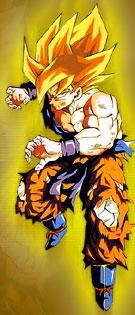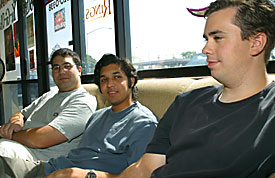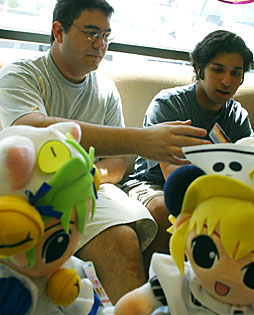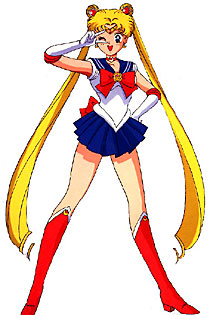 |
|
"Dragonball Z" is the No. 7 animé feature of all time.
|
|
By Lindsay Utz
Arizona Daily Wildcat
Tuesday October 15, 2002
The Japanese animation art of animé has inspired a subculture of devotees from Tokyo to Tucson. What is all the fuss about?
They don't hug Pokémon stuffed-animals, nor do they wear Akira T-shirts. Well, some of them may, but that's not the point. Try to tell them that cartoons are just for kids, and they'll challenge you. The Tucson Animation Screening Society doesn't mess around when it comes to their animation. This isn't Saturday morning cartoon business ∑ actually ∑ it's all day Saturday.
Yes, that's right. The club meets every other Saturday from 1 in the afternoon until 9 in the evening. All day long, nearly 200 people gather in the Physics and Atmospheric Sciences auditorium to watch and watch and watch more animé.
What's the deal with this animé thing?
Animé is the American cult term given to the animation films and TV series that come from Japan. Essentially, animé is Japanese for cartoons ų but not cartoons as Americans know them.
 |
|
RANDY METCALF/Arizona Daily Wildcat
|
UA students, Rod Agullo, SuJoy Ganguly and Thomas Kneeling hang out yesterday at Amazing Discoveries, 2545 E. Speedway Blvd., a store that sells animé movies, graphic novels and collectibles. Ganguly is the president of the Tucson Animé Screening Society. (Left) "Astro Boy," the No. 4 animé feature of all time according to The Animé Overview.
|
|
Sujoy Ganguly, the president of the Tucson Animé Screening Society (TASS) describes animé as "Everything from the fluffiest, poppiest most saccharin-sweet thing you've ever seen in your life to the darkest, angstiest most violent thing."
It certainly doesn't sound much like the colorful and noisy American cartoons we know so well. That's because American animation has nothing in common with animé, well, except for the animation part.
"Animé covers a huge area of genres," said Ganguly. "There's
science fiction, romance, comedy, fantasy, adventure. It's not always geared to children."
One of the biggest misconceptions about animé is that it is meant for children.
"It has more complex themes than American animation, generally speaking," Ganguly said. "Once they see it and see the nudity and adult themes, they think that it's still supposed to be for kids and that the people in Japan are just twisted."
Jorge Rico, an employee of Tucson comic and pop culture store R-Galaxy, said that 75 percent of his clientele come in for animé.
"Everyone comes in from all walks of life," Rico said. "I see little kids to 40-year-old adults and a bunch of college kids and jocks."
Another widespread misconception about animé is that everybody who watches it is totally obsessed and interested in nothing else. This person, according to Ganguly, in animé language, is called a "fanboy."
"The biggest misconception is that everybody is a fanboy," Ganguly said. "Everybody is this super-geeky guy who sits in front of their computer all day. He's a loser, he's a loner and that kind of thing."
Top 10 Animé of All Time
Think animé is a recent phenomenon? Some of the most popular examples of Japanese animation were released over 30 years ago. Want to know more? Here's a list of the top 10 most influential and commercially successful animé films and TV shows of all time, according to The Animé Overview:
1. Princess Mononoke (Mononoke Hime)
2. Akira
3. Pokémon
4. Astro Boy (Tetsuwan Atom)
5. Robotech Macross)
6. Sailor Moon
7. Dragonball Z
8. Ghost In the Shell (Koukaku Kidoutai)
9. Neon Genesis Evangelion (Shinseiki Evangelion)
10. Star Blazers (Uchuu Senchen Yamato)
|
Ganguly admitted that fanboys do exist. They even enjoy a certain type of animé, dubbed fanboy shows.
"Guy meets eight really good looking women and they all love him. These shows are goofy, unrealistic, sort of trite shows," Ganguly said. "I personally don't enjoy that part of animé. But there is a large percentage of audience who do love it, and so we show it and they're happy and that works for me."
You may accuse Ganguly of being a fanboy himself, since he is, after all, the president of the animé club.
"I watch animé and I really enjoy it, but I'm a little more critical of it than the typical fanboy," Ganguly said. "I don't like shows that are typically geared to fanboys. Actually, I really despise them."
You don't have to be a freaky fanatic to really enjoy animé. And you don't have to be a guy, either. The club is surprisingly split right down the middle ų half men, half women.
 |
|
"Ghost in the Shell" is an animé film generated for an adult audience.
|
|
In Japan, animé is huge. Japanese television is bursting with animation. Prime time shows are animation series or animation soap operas, for example. Not only that, but two of the three highest-grossing films in Japanese history are animé. These are "Spirited Away" and "Princess Mononoke," both done by director Hayao Miyazaki, who has been dubbed the Walt Disney of Japan.
Animé defines Japanese pop culture. TASS even works with the East Asian studies department because of the connection between animé and popular culture studies.
There are quite a few members in the club currently who speak Japanese. These members will sometimes do an "in-house fan subbing" if they feel the subtitles weren't done well enough. They take the raw version of an animé show or film and actually subtitle it themselves.
When and Where ∑
· The Tucson Animation Screening Society holds meetings every two weeks.
· The next public screening is on Saturday, Oct. 19 in the PAS building, Room 201 at 1 p.m.
· Some meetings are for members only. 4 Cost is $20 a year for membership.
· Visit http://www.tass-anime.com for more information.
|
If subtitling their own films doesn't prove their dedication and seriousness, then maybe a look at their upcoming features will. This Saturday, they will be showing an animé program that started just last Thursday in Japan.
What's impressive is that TASS is able to obtain a lot of really obscure animé that most people wouldn't normally get to see so quickly or even see at all.
"Most people don't get to see the most cutting-edge thing, but just like anything in inter-popular culture, they're never going to see the most cutting-edge," Ganguly said. "You don't hear the most cutting edge music in the top 40 radio."
People have their own personal story about how they were introduced to animé. Most fans have been watching it for years and like it for a lot of different reasons.
Ganguly's first encounter with animé was "Robotech" on the Cartoon Network when he was in the 8th grade. He has been following and enjoying animé for nearly six years now.
Rico is not only an employee at R-Galaxy, but also a fan of animé. He is from Tucson and used to go to TASS meetings when he was in high school. His favorite director is Miyazaki and his favorite film, "Princess Monanoke." He sees animé as not only entertaining, but also an art that carries a social message.
 |
|
RANDY METCALF/Arizona Daily Wildcat
|
Students Rod Agullo and SuJoy Ganguly, members of the Tucson Animé Screening Society, sit in front of animé characters yesterday at Amazing Discoveries.
|
|
"What I like about őPrincess Monanoke' is the man-versus-nature quality of it," Rico said. "How man keeps destroying nature and nature is fighting back to take back its land, and how the common theme in most of his movies is how as soon as we start taking from nature, nature is going to be taking back from us. And soon nature is just going to rule the world again."
Animé has its older fans as well.
Professor James Stafford, who taught an animé course at UA last year, discovered animé in 1995, while living in Paris. He happened to see "Sailor Moon," a series on French television.
"It caught my eye as being something very different," Stafford said.
For Stafford, what is so appealing about animé is the rich character development.
"With a lot of American animation or other animation around the world, you get a lot of things that are very episodic and there's not much time for character development and there's not too much linking the episodes together," Stafford said.
 |
|
"Sailor Moon," the No. 6 animé feature of all time, is popular among both children and adults.
|
|
Animé is sometimes accused of being a bit pornographic. Although there is a lot of animé porn out there, the club draws a line at sexually explicit material.
"I'm not going to defend all animé," Ganguly said. "I think some animé is just not worth defending. You can't defend every piece of U.S. pop culture."
In fact, the members of TASS don't have to like everything they see. They are critical with their art, just as any media fan should be. Although there are no organized discussions at the meetings, Ganguly said critical discussion is bound to happen in a big group like theirs.
TASS organizes their meetings to mirror the mood and time of day. The earlier in the day, the lighter and fluffier the programs are. The meeting would begin, for instance, with a magical girl show, something fluffy and poppy, like "Sailor Moon." The later in the day, the darker the material gets. Toward the end of the evening, the animé may get heavier and a bit more intense.
"There's a huge range of stuff out there and we show a pretty big range of it. So there's something you'll like, I'm pretty sure. Come with an open mind and you'll enjoy something," Ganguly said.
"It's in its own world, but it's true to its own world, and so I find that fascinating."

